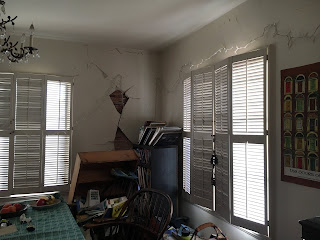The first time it happened
I twisted my leg muscles
I rose from the chair
realized nothing
remembered nothing
Later I would say
I remember
I was reading Sylvia Plath’s poems
finished watching a movie about her
gazing at the cats on the sofa
The second time
I was reviewing the police report.
I did not need to see a doctor.
Gasps in logic
watching them carry the body
away like watching someone
you don’t know getting undressed.
At an age where I should be settled—
own a house, pay a mortgage,
though I wouldn’t have lived on a busy corner.
Worse than a 100 year old plant dying
worse than wondering if it would
ever bloom, hummingbirds pollinating it
on the small porch
white blooms.
Can one ever be satisfied?
Each time I tell people
eyes hungry, questions
“good detail” they burp
like trying on a girlfriend’s clothes
they run throiugh the scenario
and see if it fits.
I want to share
I don’t want to share
Each day clearing the bottom rooms—
kitchen, dining room, and how living room,
I hear the crash
how much easier it would be now
with nothing in those rooms
to slow it down.
I think of the burger place on Cutting and San Pablo
the Black woman with a white hair net
her son helping out.
Next door the barber with a bobbing bird
in his window—
buildings one
or re-used
then gone.
We would push against the counter
to stand up.
Such a bargain.
Even now, inquiries.
Like my mother’s stroke and six months later
her death, it keeps coming—
different seasons but the same
nausea and unanticipation
no way of pressing a blade
closer, shiny, fixated
alone, a wimpering animal
against the cut.
All at once I felt a snap
and a rush and as if it were
100 below I was shaking.
I could hear my mother’s voice,
“put a sweater on” but I didn’t.
I was crying to live in those
moments, as if a door had slammed
or someone had locked me out
of life. Chest heaving,
my neighbor called—
“stay with me” I said
until I realized I couldn’t hold
the phone anymore.
What would I take?
The cats wouldn’t come into the carriers.
I emerged into the outside
of my skin, the street,
the house like a reptile
regurgitating its meal.
Sirens without noise,
red engine,
white pickup,
crowd across the street
everything ready to explode
“stand back,” he said, as I filmed
two trucks pulling the criminal truck out of the house.
It would be a week until they bandaged
the house, wound gaping
but not repair it yet
even after a month.
First the abatement
“rip it out” then stabilize.
In a world of dead languages
the same worn phrases used
pain described of a structure taken apart.
A few people were crying, or at least
hands on their faces.
Go away I wanted to shout
and to the man who stepped in front
videoing, blocking me,
it’s me you are taking a part.
My mind completely mixed up
like a puzzle—what’s first
like an argument about my own identity.
What stability means, in one
moment having to leave, skip to the next
chapter because the reading has been interrupted.


